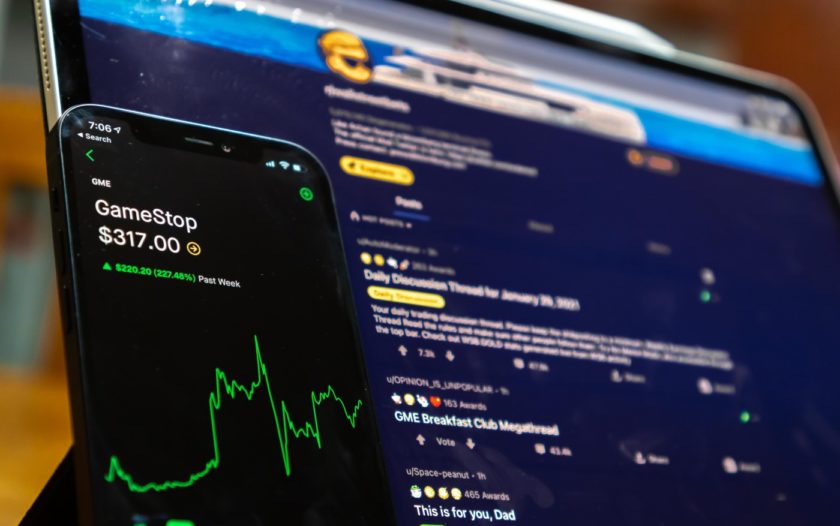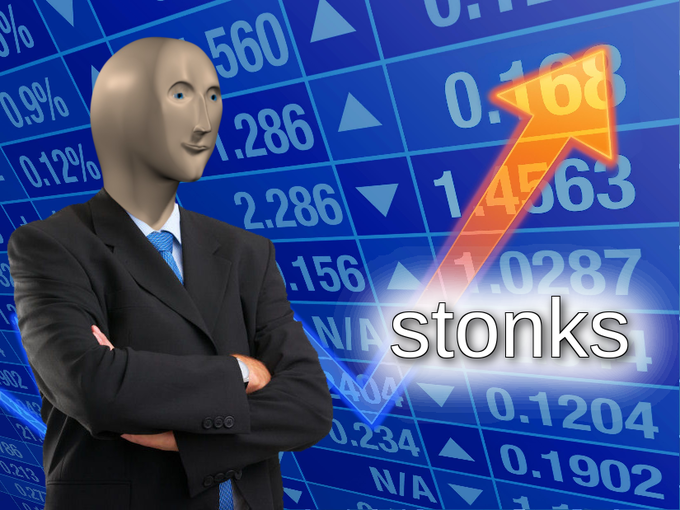All You Need to Know About GameStop Stonks (AKA GameStonks) But Were Too Afraid to Ask
About Casey
Casey is a reformed sports journalist tackling a new game of financial services writing. Mike Francesa once called her a “great girl.”
Read full bio
Republicans vs. Democrats. Yankees vs. Red Sox. Black and blue vs. White and gold. And now, what’s been dubbed Main Street vs. Wall Street.
GameStop, once a hub in suburban shopping malls frequented by teenage gamers, seemed to be so 2000 and late. Then this month, Reddit users—particularly those using the Wall Street Bets subreddit—beat hedge fund managers and traders at their own game.
In short (Easter egg!), a bunch of average-Joe individual investors turned Reddit into a trading room floor.
The year range of GME, or GameStop Corp.’s stock, is $2.57 to $483. Meaning in the past 52 weeks, the stock cost as little as $2.57 per share and as much as $483 per share.
Here’s how it all went down…
What even is a hedge fund?
Perhaps you heard of hedge funds for the first time after stumbling upon a finance bro who works for one on Bumble, but you genuinely haven’t the slightest idea what he’s talking about.
This ain’t it, but give Avalon Penrose a daytime Emmy.
a normal person explains what’s happening on the stock market: pic.twitter.com/zKKvULCirX
— Avalon Penrose (@avalonpenrose) January 27, 2021
Hedge funds are alternative investments designed to protect portfolios by using pooled funds to earn positive returns for their investors, regardless of market uncertainty. Often only accredited investors can make use of hedge funds as they face fewer regulations from the Securities and Exchange Commission (SEC) than more traditional funds, like mutual funds.
Imgur user AoShin, among others, claimed at least one hedge fund, Melvin Capital, has gone bankrupt from the GameStop stock phenomenon. A spokesperson for the hedge fund, a top Wall Street performer, denied that the firm is collapsing, though it has closed its position on GME, reportedly after taking a huge loss. “The social media posts about Melvin Capital going bankrupt are categorically false,” he said in a statement.
What about short selling?
If you’ve seen The Big Short or Wolf of Wall Street, you may have some understanding of what short selling is. Basically, this is when an investor borrows a stock, then sells the stock to buy it back later and return to the lender. They’re taking a gamble that the price of the stock they’re selling will drop, netting them a profit.
This is what hedge funds, like Melvin Capital, were doing with GameStop stock. But the plan backfired.
Because markets are unpredictable, short selling comes with risks. If the stock ends up gaining instead of losing, the short seller is in a pickle because they have no choice but to buy it back. There’s no limit to how high a share price can go, making losses for the short seller infinite, in theory.
That’s where Reddit users and other people flocking to Robinhood come in. They pulled off what in the financial world is called a short squeeze. (Apparently, this has nothing to do with laying down a bunt.) The Redditors and company drove up the GME share price, forcing short sellers to buy back the shares at a lower price instead of a higher price.
The longer a seller holds its short position, the higher the borrowing fee, which can fluctuate from day to day but has hovered between 20-80%. If it reaches the point where a seller can’t cover the cost, it has to close its position—which is what happened to Melvin Capital—or declare bankruptcy.
OK, but what are stonks?
Source: Special Meme Fresh/Facebook
No, stonks aren’t what the Grinch invests in. But they do stink, stank, stunk something funky right now.
Even Twitter’s favorite octogenarian is trying to figure out what a stonk is.
Y’all just be saying anything. Stonks?
— Dionne Warwick (@dionnewarwick) January 27, 2021
The word “stonks” is merely an intentional misspelling of stocks, comparable to “o rly?” and just about any other meme-ification you can think of. It’s ironic—you know, like the way you like Justin Bieber—and used particularly to refer to stocks taking a loss.
The OG stonks meme (pictured above) first hit the interwebs in 2017, according to Know Your Meme, a site that, you guessed it, tracks the origin of memes. The image features Meme Man, a character who dates back to 2014, presumably on the body of a day trader (or someone in a suit), in front of a slew of numbers and arrows meant to represent the stock market and the word stonks.
Why millennials get involved (or should get involved) in the stock market
Certainly, millennials aren’t getting into stocks just to create memes, though that may be a big part of it. Apps like Robinhood have made the stock market more accessible for inexperienced investors. Millennials in particular, who may be a bit newer to the game, are getting involved as a way to get ahead on retirement savings; help pay off credit card debt, student loans, and other debt; make lifestyle upgrades; and more. But they’re doing it at a slower clip than older generations.
Last March when the pandemic hit the U.S. and the stock market took a massive blow, many millennials weren’t affected. At the time, fewer than 1 in 5 millennials had an investment account, which can prevent them from building long-term wealth. Many financial advisors and experts recommend that this generation put as much as 90% of their retirement savings into stocks or mutual funds/exchange-traded funds (ETFs) that invest in stocks.
Market crashes can be intimidating, but be mindful that it tends to rebound quickly. The market has never ended a 20-year period down, including the span of 1998 to 2008, at the peak of the Great Recession. Similarly, the stock market suffered its worst first quarter ever in 2020, as the Dow dropped 410 points for a decline of 23%. The Dow closed 2020 at a record high, ending the year with a gain of 7.3%.
Why GameStop?
GameStop has been losing money for several years as a seemingly obsolete business, with companies like Amazon now in the video game market. The company is expected to continue to lose money over the next couple of years. So, what makes the stock appealing?
On Jan. 11, GameStop announced the addition of three new members to its board, including Chewy co-founder Ryan Cohen, who saw an opportunity to bring his digital background to a traditional brick-and-mortar company.
Over the summer, GameStop stock was $4/share. Just since the start of 2021, GameStop shares are up over 1,700% as short sellers and those trying to mess with short sellers have been all over the movement.
But while this may seem like it happened overnight, it’s actually been brewing for much longer.
So many folks (esp. the media) are missing the complete backstory on $GME and how we got here.
This has been simmering for over a year and the story behind it is great. I’ve been tracking this since September and devoured all of the details from the origin through today.
— Josh Gross (@endtwist) January 27, 2021
A Reddit user with a name not printable in a family publication—let’s call said user DeepExpletiveValue — had been in the game on GameStop since at least 2019. As it turns out, though GameStop was suffering as a retailer, it had plenty of cash-in-hand, according to its quarterly financial report (h/t Twitter user @endtwist). But the short sellers were expecting GME to go bankrupt, meaning they wouldn’t have to return their shares.
Then in late 2020, other Reddit users caught on to what DeepExpletiveValue noticed and started buying in, raising the cost of the shares little by little. Meanwhile, the short sellers had to cover, but with the share price continuing to climb, they had to buy back more shares than existed at any price, driving the price up even further. As more people took notice, including the media, share prices went through the roof.
GameStop stock isn’t alone in this sudden emergence. Other stocks like AMC Entertainment (AMC) and Blackberry (BB)—seriously, what year is it?—also have seen a meteoric rise in share prices in similar short-squeeze fashion.
A cartoon by @evahnsan. pic.twitter.com/EqefYLhlY2
— The New Yorker (@NewYorker) January 28, 2021
What’s going on with Robinhood?
Robinhood is essentially a gamification of trading. The app allows novice traders to tap into the stock market. It’s what many Reddit users and others used to drive up the price of GME shares.
The whole thing has Fyre Festival vibes, and even Ja Rule chimed in, making the analogy that much more accurate. Many of his tweets feature language that’s NSFW, but here’s a sample.
It’s terrible how Wall Street crushes the American dream… #bigbanktakelilbank #ICONN
— Ja Rule (@jarule) January 28, 2021
On Wednesday, Ja was a Robinhood stan, pushing his Twitter followers to get the app. By the next day, he was quite literally cursing its name.
That’s because Robinhood, the infamous stock trading and investing app whose tagline is “democratizing finance for all,” announced Thursday morning that it was limiting transactions on certain stocks, including GME and AMC, to position closing only. Talk about getting ratioed.
In light of current market volatility, we are restricting transactions for certain securities to position closing only, including $AMC and $GME. Read more here.Keeping Customers Informed Through Market Volatility
— Robinhood (@RobinhoodApp) January 28, 2021
But Robinhood wasn’t the only company to limit certain transactions. TD Ameritrade had also placed restrictions on some transactions involving GME, AMC, and others on Wednesday.
Webull CEO Anthony Denier told Yahoo Finance that the public perception (i.e., Twitter mob) isn’t quite right on why Robinhood, along with other online brokers like Webull, restricted trades on surging stocks like GME, AMC, and BB. Denier said his company didn’t decide to restrict access, but their clearing firm couldn’t afford the cost of settling the trades because of the collateral involved with the Depository Trust Company (DTC) two-day holding period.
Is all of this legal?
It’s a gray area.
There haven’t been any clear signs of fraudulent behavior reported—yet. Major Wall Street players have been manipulating the market for years. Now, it’s being done by people bored at home with nothing to do and those trying to “stick it to the man” after the 2008 financial crisis.
Rich People: wHy dOn'T tHe pOoR jUsT iNvEsT tHeIr mOnEy
Poor People: Ok.
Rich People: …
Rich People: wait stop— Justin McDaniel 🏳️🌈 (@JUSTINtime4aLAF) January 28, 2021
Sen. Sherrod Brown (D-Ohio), the incoming Chairman of the Senate Banking, Housing & Urban Affairs Committee, said in a statement that he plans to hold a hearing on the stock market in response to the GameStop situation.
“People on Wall Street only care about the rules when they’re the ones getting hurt,” Brown said. “American workers have known for years the Wall Street system is broken—they’ve been paying the price. It’s time for SEC and Congress to make the economy work for everyone, not just Wall Street.”
It’s something, maybe the only thing, that Democrats and Republicans can agree on. Even archnemeses Rep. Alexandria Ocasio-Cortez (D-NY) and Sen. Ted Cruz (R-Texas) landed on the same side of this argument. Though, AOC was quick to tell Cruz to, basically, GTFO.
OH MY GOD pic.twitter.com/HeldBn7hf6
— Yashar Ali 🐘 (@yashar) January 28, 2021
The Securities and Exchange Commission (SEC) said Wednesday that it is “actively monitoring” the volatility in the market in light of GME’s surge. President Joe Biden’s financial team, led by Treasury Secretary Janet Yellen, is also “monitoring the situation,” per new White House Press Secretary Jen Psaki.
All of this led to Wall Street having its worst week since October, dropping the index more than 3%. David took Round 1 against Goliath, but this fight could go the distance.










